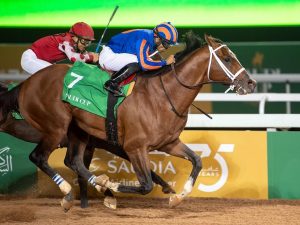By Richard Rosenblatt

Maximum Security – Photo Courtesy of Jockey Club of Saudi Arabia/Doug DeFelice
The thoroughbred racing industry received a devastating blow when champion Maximum Security’s trainer Jason Servis was among more than two dozen horse trainers, veterinarians, and others charged with a widespread scheme to secretly use misbranded and adulterated performance-enhancing drugs.
The indictments were unsealed on Monday by Geoffrey Berman, the U.S. Attorney for the Southern District of New York in Manhattan.
A total of 27 individuals are accused of participating in the scheme, which involved the manufacture, distribution and administration of the misbranded PEDs without valid medical reasons and attempting to hide their use, sometimes by falsifying veterinary bills and using fake prescriptions.
Jorge Navarro, the trainer of 2019 Dubai Golden Shaheen winner XY Jet – who this year died, apparently of a heart attack — was also charged in the scheme that branched out to Ohio, New York, New Jersey, Florida, Kentucky, and the United Arab Emirates.
“Today, we announce the criminal charges against racehorse trainers Jorge Navarro and Jason Servis as well as nine other trainers, seven veterinarians and nine drug suppliers and distributors, all involved in the criminal doping of racehorses across the United States using misbranded and adulterated performance enhancing drugs,’’ Berman said at a news conference. “This is the most far-reaching (case) of racehorse doping in the history of the Department of Justice.”
Among the misbranded substances is SGF-1000, a supplement that is advertised to promote faster healing from training and injury. According to one of the indictments, Servis directed veterinarian Alexander Chang to administer the adulterated PEDs, including SGF-1000 and other prescription veterinary drugs, without a valid medical reason.
Another indicted, Seth Fishman, is accused of manufacturing misbranded PEDs in a facility not registered with the FDA and then distributing those PEDs to trainers across the country and internationally.
Servis, a trainer for 20 years based in Monmouth Park in Oceanport, New Jersey, reached international fame when Maximum Security won the Kentucky Derby but was disqualified for interference and placed 17th. The horse would go through several setbacks, including minor physical ailments and a serious bout of colic, but recovered and went on to put together an impressive run of victories, capped by his win in the $20 million Saudi Cup on Feb. 29. The colt was voted an Eclipse Award as the nation’s top 3-year-old male.
According to the indictment, Servis “orchestrated a widespread scheme of covertly obtaining and administering adulterated and misbranded PEDs, including a PED called SGF-1000, to virtually all of the racehorses under his control.”
It went on to say that from 2018 to February 2020, Servis entered horses in approximately 1,082 race and that he and his “co-conspirators concealed the administration of PEDs from federal and state government agencies, racing officials and the betting public, by, among other things, concealing and covertly transporting PEDs between barns where Servis’ racehorses were stabled, falsifying veterinarian bills to conceal the administration of SGF-1000, and using fake prescriptions.”
Servis’ co-conspirators in the indictment are Kristian Rhein, a veterinarian; Michael Kegley, Jr., a sales rep for a firm dedicated to the production of misbranded and adulterated PEDs; Alexander Chang, a vet working at the direction of Servis; assistant trainer Henry Argueta; and Navarro, who provided Servis with the PEDs at Servis’ request.
Navarro faces charges similar to those against Servis. According to prosecutors, in an intercepted phone call between the two trainers in March 2009, Servis allegedly told Navarro that he liked a PED called SGF-1000. “I’ve been using it on everything almost,” he allegedly told Navarro.
The president and chief executive officer of the National Thoroughbred Racing Association called the federal indictments “abhorrent”.
“There is no place in our sport for individuals who treat horses with disregard for their well-being or who undermine the integrity of our competition for personal gain,’’ Alex Waldrop said in a statement released Monday by the NTRA. “We support the effort to bring these charges to light and are hopeful that their swift adjudication will help assure other horse racing participants and the public at large that our sport will not condone or tolerate the behavior alleged in the indictments.”
The National Horsemen’s Benevolent and Protective Association called the indictments “extremely troubling.
“We strongly oppose the behavior alleged in this indictment,’ the NHBPA said in a statement. “We firmly believe in striving for the highest standards of horsemanship, and our industry strongly believes that anyone participating in the types of activities alleged in this indictment should be severely punished.”
Berman said simply that those charged were simply out to make money with little regard for the horses.
“The defendants charged today engaged in not for the love of the sport, certainly not for the (love of the) horse, but for money to increase (their) racehorse’s chances of winning a race by manufacturing and selling illegal drugs,’’ Berman said. “The racehorses that paid the price for the defendant’s greed is the animals were injected with and force fed with experimental drugs, drugs that make them run faster and mask pain which can lead to their injury or death.”
FBI assistant director William F. Sweeney, Jr., said the investigation “reveals the cruelty and inhumane treatment these horses suffered.
“These men allegedly saw the $100 billion dollar global horse racing industry as their way to get rich at the expense of the animals that were doing all the hard work,’’ Sweeney said. “Our investigation reveals the cruelty and inhumane treatment these horses suffered all to win a race. The FBI New York Joint Eurasian Organized Crime Task Force worked along with our law enforcement partners at the New York State Police, FDA, and DEA worked to stop this ring of criminals from abusing helpless animals simply so they could cheat the odds and rake in millions of dollars.”

Over the years while working at The Associated Press, Rich Rosenblatt became a familiar name to legions of the horse racing fans and industry insiders with his award-winning articles on horse racing and his stories from the backstretch.
In addition to being an astute observer of sports, Rosenblatt is the co-author of The All-American Chili Cookbook. His work has been seen in just about every publication in the world, including The New York Times, The Washington Post and Time Magazine.


